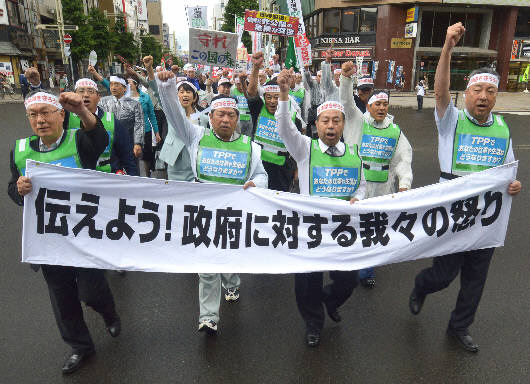Ruling bloc further delays lower house TPP vote amid strong opposition

Japan Today | 8 November 2016
Ruling bloc further delays lower house TPP vote amid strong opposition
TOKYO — The Japanese government’s plan to rapidly ratify the Trans-Pacific Partnership free trade agreement hit another setback Monday, with the ruling coalition deciding not to put the pact and related bills up for a House of Representatives vote the following day.
The Democratic Party and smaller opposition parties have held firm in their insistence that they will not participate in voting on the trade pact while Yuji Yamamoto remains in the post of minister of agriculture, forestry and fisheries, following his recent remarks about railroading the TPP through the Diet.
The ruling parties had affirmed with the government earlier Monday their resolve to get the deal approved quickly, fueling anticipation they might push the TPP through a lower house plenary session Tuesday with or without the participation of opposition parties.
The TPP was cleared by a special lower house committee Friday, a key hurdle for the pact prior to a plenary vote, despite a walkout by opposition lawmakers.
But a vote during Tuesday’s plenary session was off the table after ruling and opposition lawmakers again clashed at a meeting of the lower house steering committee Monday afternoon.
The Democratic Party remains open to submitting a no-confidence motion against Yamamoto in the lower house, the party’s secretary general Yoshihiko Noda told a press conference after the meeting.
At a consultation meeting between the government and members of the Liberal Democratic Party and junior coalition partner Komeito on Monday morning, Prime Minister Shinzo Abe said Yamamoto’s remarks have “caused great trouble to the ruling parties.”
Komeito leader Natsuo Yamaguchi told reporters after the meeting that Yamamoto need not step down, saying “the prime minister and chief Cabinet secretary have already apologized.”
If the lower house ratifies the TPP and approves the related bills, its decision will go into effect automatically after 30 days even if the upper house does not follow suit. With the current extraordinary Diet session ending Nov. 30, the ruling coalition is considering extending the session by 10 days or so.
Abe has held up the ratification of the TPP, which Japan signed with the United States and 10 other Pacific Rim nations in February, as the key goal of the current Diet session.
His eagerness to get the TPP approved comes amid uncertainty over whether U.S. President Barack Obama will be able to fulfill his vow to ratify the deal before leaving office in January.
Both main candidates to succeed Obama in Tuesday’s U.S. presidential election have expressed opposition to ratifying the deal in its current form.
Japan’s opposition parties warned at the start of the current Diet session that they would fight any attempt to rush deliberations on the TPP.
They closed in on Yamamoto after he said at a fundraising party in August that the chief of the Diet steering committee, LDP lawmaker Tsutomu Sato, could decide to steamroll the TPP through parliament. Yamamoto then described his earlier remark as “a joke that almost got me fired,” attracting further criticism.
But the government has insisted the gaffes do not warrant dismissal. Chief Cabinet Secretary Yoshihide Suga reiterated at a press conference Monday that Yamamoto has apologized and retracted his remarks.
“A no-confidence motion against the agriculture minister is one of our options to prevent the railroading of the TPP through the current Diet session,” Democratic Party Diet affairs chief Kazunori Yamanoi told reporters after the meeting with others in his party and the smaller Japanese Communist Party on Monday.
The TPP would cover around 40 percent of the world economy, with Japan and the United States together making up 80 percent of the envisaged free trade bloc. Implementation of the pact would see Japan eventually remove tariffs on 95 percent of imported products by value.





